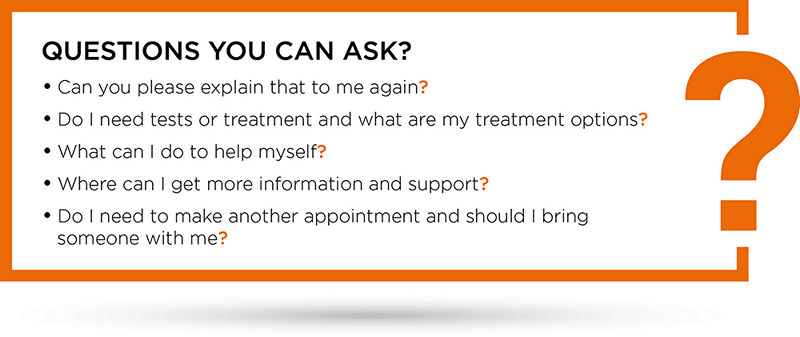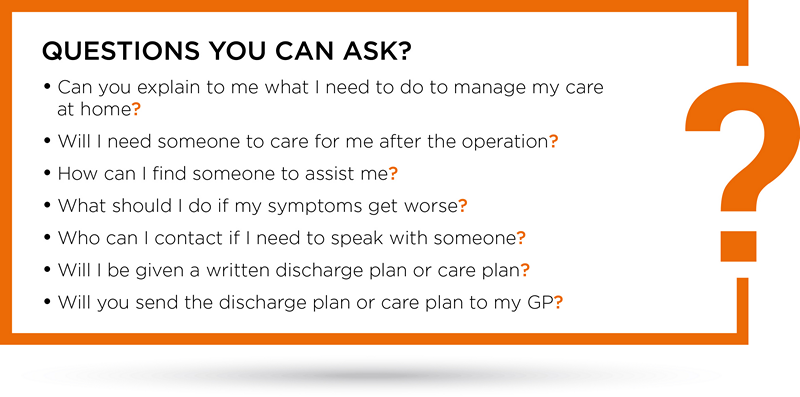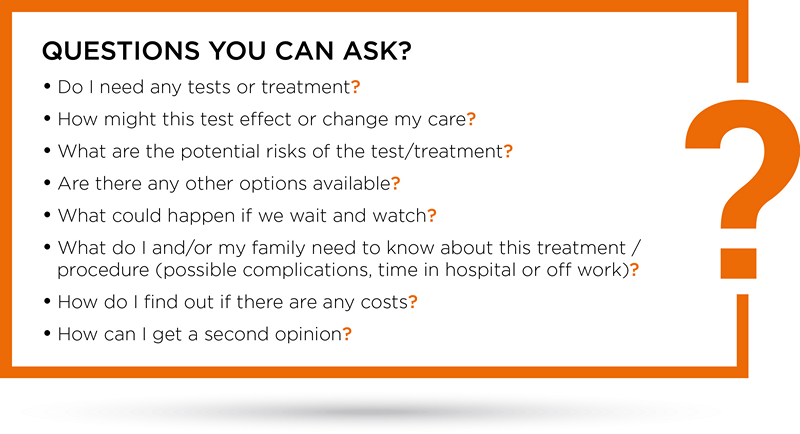Questions to Ask Your GP
Being actively involved, and working in partnership with you doctor and all healthcare providers, can help ensure you get the care that is right for you.
Being actively involved, and working in partnership with you doctor and all healthcare providers, can help ensure you get the care that is right for you.You can use the information outline below when you talk to your doctor and healthcare providers, including nurses, pharmacists, specialists, allied health and mental health workers.
> Ask Questions
You have a right to ask questions about your health and healthcare. Don’t feel shy about asking questions if you are unsure about the information you are given.
In fact, asking questions will help your doctor and other healthcare providers understand what worries you about your health and what is important to you when deciding your treatment.
If you are not confident to ask questions, bring a family member, friend or representative to help you. You can also ask for an interpreter from the Translating and Interpreting Service, which is a national service provided by the Australian Government (Phone: 131 450).
Writing your questions down before your appointment can help you feel prepared to get the answers you need. A Question Builder tool is available to help you prepare questions to bring to your appointment. This tool can be found here.

> Health Information
Good-quality and reliable health information can help you make informed decisions about your healthcare. The best way to get health information is to ask your doctor or other healthcare provider.
If you seek advice from a complementary therapist (e.g. a naturopath, osteopath or traditional Chinese medicine practitioner), it is very important to let your regular healthcare provider know about any treatments or advice you receive from the complementary therapist. This can help to reduce the risk of something going wrong.
The information you find online is not always reliable. However, government-endorsed health websites such as Healthdirect Australia, industry bodies such as the Australian Medical Association, and organisations like beyondblue and Cancer Council Australia have reliable information.
> Understand the Risks and Benefits of Medical Tests, Treatments & Procedures
Before making a decision about your health care, it is important that you fully understand the risks and benefits of any medical test, treatment and procedure recommended by your doctor.
Asking your doctor or other healthcare provider questions about your testing and treatment options will help you make better decisions together.
Make sure you get the results of your test. Do not assume no news is good news.
Choosing Wisely Australia provides a useful resource for people wishing to find out more information about their treatment options. Their website lists recommendations for specific tests, treatments and procedures that may be unnecessary and sometimes harmful for consumers. The Choosing Wisely website can be found here.

> Keep a List of all the Medicines you are Taking
You can use the list to let your doctor and pharmacist know the medicines you are taking. Include vitamins and any other supplements on your list.
It is important you understand how to take your medication, especially if you use more than one medicine. If you have any questions about the directions on your medicine labels you can always ask your pharmacist. If you take multiple medications, and need help with knowing how and when to take these medicines, you can ask your doctor for a referral for a Home Medicines Review. This will involve a pharmacist visiting you at home and talking to you about the medicines you are taking.
A lot of helpful information about medicines is provided by NPS MedicineWise. The NPS MedicineWise website can be found here.
> Confirm what will happen before your Operation or other Procedure
Ask which doctor or other healthcare provider will be in charge of your procedure and check with them what operation they plan to perform.
If at any time you don’t understand what is being said to you, ask for the information to be repeated or explained in another way. You should be asked several questions to confirm the procedure you are having and the site of the procedure should be marked on your body with a pen.
Tell the doctor or other healthcare provider about any allergies and reactions to medicines you know of and ask them to note this in your medical record.
> Ask About your Care when you Leave Hospital
Ask to have your family, carer and/or representative involved in discussions about your discharge from hospital.
Ask for a written discharge plan or care plan that summarises why you came into hospital, the care you received, the plan of action when you leave the hospital and lists any follow-up appointments.

> Know Your Rights
Everyone who is seeking or receiving care in the Australian health system has certain rights regarding their care.
You have a right to:
- Access healthcare
- Receive safe and high-quality care
- Be shown respect
- Be informed about services, treatment, options and costs in a clear and open way
- Be included in decisions and choices about your care
- Privacy and confidentiality regarding the information you provide
- Comment on care and have your concerns addressed.
You can read more about your rights in the Australian Charter of Healthcare Rights, which was developed by the Commission.
> Understand Privacy and Accessing your Medical Record
Your doctor and other healthcare providers keep a record of your health and medical history.
They are required by law (the Privacy Act 1988) to keep your medical record confidential and private. Occasionally, relevant parts of your medical record will need to be shared between healthcare providers as part of your care.
If you would like access to your medical record, you can ask to see it. If you have registered for the electronic My Health Record, you can access this yourself on the internet. If you notice something missing from your medical record or your My Health Record, ask your healthcare provider to have it corrected.
To register for an electronic health record visit: https://myhealthrecord.gov.au and for guidance on how to access and correct your medical record visit: https://www.oaic.gov.au/engage-with-us/consultations/health-privacy-guidance/fact-sheet-how-you-can-access-or-correct-your-health-information.
> Your Feedback helps Improve Healthcare Safety and Quality
Healthcare providers value your feedback. It helps the organisation understand what they are doing well, and what might need improvement.
If you have a complaint about your care, try to resolve it directly with the hospital or healthcare provider. Many hospitals have a patient advocate or liaison officer whom you can talk to about your concerns.
If the healthcare provider does not respond, or you are not happy with the response you receive, you may wish to contact your state’s health complaints authority:
NSW Health Care Complaints Commission
Web: www.hccc.nsw.gov.au
Phone: 1800 043 159
> Getting the Best from your GP Visit
Your general practitioner’s (GP’s) role is to help you look after your health needs, and those of families and others in the community. Your GP identifies the nature of your health problem from a broad range of possibilities, and then provides appropriate care.
Confidentiality
Anything you discuss with your GP is subject to strict privacy rules. However, you need to know that whatever is said and noted by your GP could be requested by a court or, subject to your permission, released to an insurance company.
How to Prepare for your Visit
It is frustrating to visit your GP, only to get home and realise you have forgotten something your GP said.
Suggestions
- Before your visit, write down the questions you wish to ask.
- Bring a list of medications you take now, including their doses and frequency. Also remember to tell your GP whether you take complementary medications, medications from other doctors or dentists, or recreational drugs.
- Remember to tell your GP about medications that may have given you an allergic or adverse reaction.
- Take notes, or ask your GP to write down things you might forget or don’t understand, particularly about medications.
- Take a friend or a family member with you.
Communication
Communication is the key to a good consultation. Your GP needs basic information to work out your health issues. Be honest with them. Discuss openly any fears, worries or concerns you may have about your illness or the treatment your GP suggests.
Remember to tell your GP if you have particular symptoms such as pain or nausea, if you are not sleeping, if you have lost weight, if you are tired, or anything else not normal for you. Tell your GP when these symptoms began, how they developed, or if anything makes the symptoms better or worse.
Having a Regular GP
The benefit of a regular GP is that they get to know your medical history. They build up an understanding of your health needs, current problems and whether a treatment is right for you.
At times you may want to seek a second opinion. This may help you understand your problem and which health choices are right for you. There may also be times when you are unhappy with the service from your GP. Talk to your GP or the practice staff about it.
Appointments
To get the best care and attention from your GP, it is important to make an appointment for the appropriate length of time. It is recommended that you:
- Make a short appointment for repeat prescriptions
- Make a standard appointment for coughs, colds or flu, injections, blood pressure checks, nausea, abdominal pain, sporting injuries, and so on
- Make a longer appointment if it is your first visit to the GP, or if you would like a full check-up, travel medicine advice, counselling, or if you have more than one issue.
Remember to make a separate appointment for each family member who needs to be seen.
Although you don’t need to disclose to the receptionist your reasons for making an appointment with your GP, you might like to ask them for advice on an appropriate appointment length.
Also, fees may vary with the length of consultation. Remember to ask.
Computers in Practices
Computers can be used by your doctor in a number of ways, such as:
- An aid to prescribing your medication and the appropriate dose;
- To record your medical history;
- To provide reminders for follow-up visits for immunisation, cervical screening (pap smear), and so on;
- To receive pathology and other results quickly and securely;
- To access the Internet and email services;
- To interact with My Health Record (a national electronic health record independent of your doctor’s own records).
Other Tips
- To help you remember what medications you are taking and to assist your GP when re-prescribing, keep the box the medication came in.
- On your first visit to a GP, spend some time making notes about your personal health history, and take them with you.
- If you are kept waiting, it may be because your GP needs to spend time with another patient who is in a crisis situation. On another occasion you may need the extra time.
- If you need a reminder about the next injection, blood test, and so on, ask the GP or reception staff to add you to their recall list.
- You can ask for copies of your test results and specialist letters.
- Many written resources that GPs provide to their patients are available in larger fonts and in multiple languages. Just ask.
Links
Multicultural Health Communication Service
This NSW Health website provides multi-lingual resources for patients.
http://www.mhcs.health.nsw.gov.au/
My Health Record
This Australian Digital Health Agency web resource explains the national electronic medical record.
https://myhealthrecord.gov.au/internet/mhr/publishing.nsf/content/home
